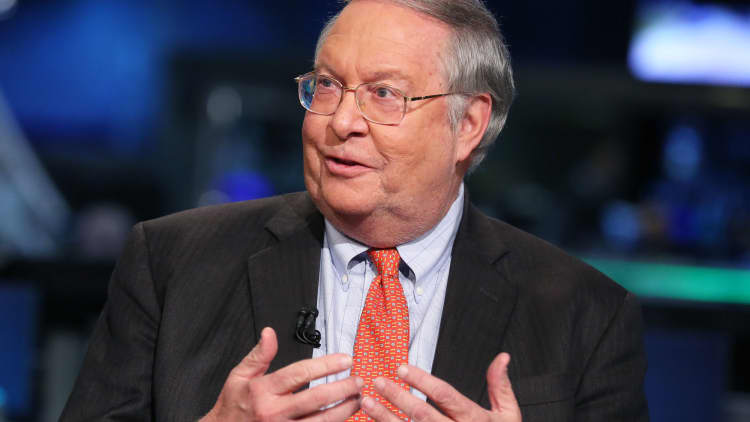
It was a brutal holiday season for brick-and-mortar retailers. Target, Macy's, Kohl's and J.C. Penney all served up disappointing numbers for investors last month.
Amazon.com was the clear beneficiary.
The online retailer is expected to report a 25 percent increase in fourth-quarter sales to $44.7 billion, according to the average estimate of analysts surveyed by Thomson Reuters. The company reports earnings after the bell Thursday. Earnings per share likely jumped to $1.35 from $1, thanks to rising profit at the cloud computing business Amazon Web Services (AWS).
"Based on largely tepid holiday results elsewhere in retail, we think that AMZN captured an outsized amount of share," wrote Edward Yruma, an analyst at Pacific Crest Securities, in a report on Jan. 29. "It will continue to take market share and also benefit as total share accorded to e-commerce continues to grow."
Yruma recommends buying the shares and has a $905 price target on Amazon, 9.9 percent above the stock's closing price on Tuesday.
The transition from offline to online is nothing new. It's the story of Amazon, starting with books in the 1990s and moving to almost every other segment of retail since then.
WATCH: This employee used a trick he learned at Amazon to start his own company

Amazon keeps punishing competitors by constantly adding new features and services to its logistics network and subscription offerings, ensuring it has the best prices, widest selection of products and most efficient delivery systems. Meanwhile, malls are going vacant as Macy's, Sears and J.C. Penney close stores.
Prime memberships at Amazon run $99 a year and include speedy shipping (even on Sundays), digital content like music and video, one-hour restaurant delivery and access to the Prime Pantry grocery service. With the Echo personal assistant, the hottest-selling device over the holidays, Amazon makes all of that and much more available with voice commands.
Add it all up and Amazon isn't just spearheading the continued shift to web and mobile commerce, but is bundling it all together in ways that no rival can match.
In a report early last year, eMarketer predicted Amazon would grow 13 percent a year through 2020, while none of the world's other top 20 retailers would expand more than 7 percent annually. Factoring in all of Amazon's businesses, growth will be even faster. According to analysts polled by FactSet, sales will increase 23 percent in 2017, 21 percent in 2018 and 18 percent in 2019, following 28 percent in the year that just ended.
Wall Street remains exceptionally bullish on the stock, with 91 percent of analysts tracked by FactSet carrying "buy" recommendations.
But the administration of President Donald Trump has introduced some investor skepticism. Trump and Amazon CEO Jeff Bezos publicly sparred during the campaign, in part over how Trump was covered by The Washington Post, which Bezos owns. Trump indicated that Amazon had an antitrust issue and would have "such problems" if he were elected.
After slumping almost 9 percent in the four trading days following the election, Amazon shares bounced back and are trading near a record. Concern remains that Trump's travel ban focused on seven Muslim-majority nations and his potential reforms of the H-1B visa program could hurt Amazon and other tech companies that rely on foreign talent.
From a purely business standpoint, Amazon is riding high.
In addition to growth in e-commerce and a burgeoning gadget business with the Echo and Fire TV stick, Amazon is at the heart of business computing.
More enterprises are unplugging their servers and storage arrays and instead opting to run their workloads on computers that sit in AWS data centers. Amazon controls 45 percent of the cloud infrastructure market, more than double the market share of MIcrosoft, Google and IBM combined, according to Synergy Research.
Relative to Amazon's core business, AWS is a massive profit center and accounts for almost all of the company's operating margin.
"Given AWS' rapid pace of innovation, strong customer base, and ongoing efficiency gains, we believe cloud computing dominance and increased profitability is set to continue," wrote Robert Drbul, an analyst at Guggenheim Securities, in a report on Jan. 30. Drbul has a "buy" recommendation and $950 price target.


